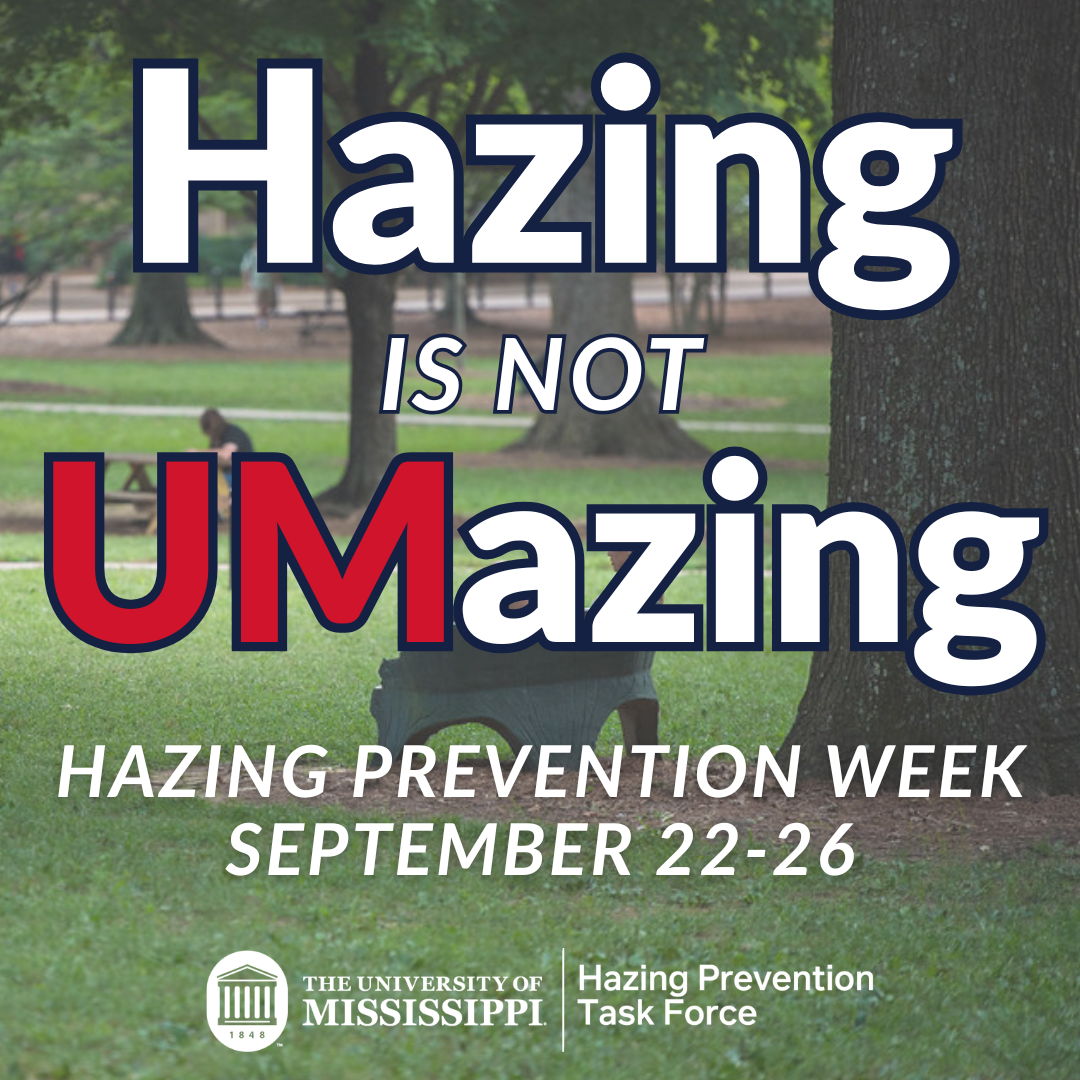Hazing Prevention Task Force
The Hazing Prevention Task Force brings together University of Mississippi community members to enhance campus organizations and the student experience by promoting education, prevention, and safety.
- Home
- Departmental Directory
- Division of Student Affairs
- Hazing Prevention Task Force | Ole Miss

What is Hazing?
The term "hazing" means any intentional, knowing, or reckless act committed by a person, whether individually or in concert with other persons, against a student that:
- (I) was committed in connection with an initiation into, an affiliation with, or the maintenance of membership in, an organization (e.g., a club, society, association, athletic team, fraternity, sorority, or student government);
- (II) either (a) causes or is likely to contribute to a substantial risk of physical injury, mental harm, or degradation, or (b) would be viewed by a reasonable person as an act, task, project, or responsibility given or held unequally by an individual or a subset of the organization or program based solely on the status of their membership; and
- (III) cannot be demonstrated to further the goals of a legitimate educational curriculum, co-curricular program, or military training program.
- Interfering with or limiting a student’s academic schedule.
- Forced or coerced consumption of food, alcohol, substances, or concoctions.
- Deprivation of food.
- Forced or coerced wearing of specific apparel.
- Expecting new members/rookies/aspirants to perform personal service or menial tasks for other members such as running errands, cooking, sober driving, phone duty, etc.
- Expecting new members/rookies/aspirants to engage in undue financial expenditures such as paying for gas, food, clothes, etc.
- Forced or coerced social isolation, use or limitation of social media, or restriction of communication devices.
- Forced or coerced limitations of travel locations and/or methods.
- Forced or coerced physical altercations with others.
- Placing one in fear of bodily harm.
- Forced or coerced line-ups, drills/tests, exercises in a manner that a reasonable person would consider excessive or dangerous.
- Unreasonable exposure to weather.
- Completing tasks to obtain signatures.
- Expecting certain items to always be in one’s possession.
- Forced or coerced sleep deprivation.
- Deviation from a new member education program submitted to the Office of Fraternity and Sorority Life, such as “Hell Week” activities.
- Damage to or theft of property, or any other illegal act.
- Violation of any University policy.
- Hazing occurs in sports teams, clubs, Greek life, cheerleading, honor societies and more.
- Hazing is often about power and control. Hazing does not build unity.
- More than half of students in colleges and universities involved in clubs, sports teams, and organizations have experienced hazing.
- A significant number of hazing incidents and deaths involve alcohol consumption.
- Students are more likely to be hazed if they knew an adult who was hazed.
- Two in five students say they are aware of hazing taking place on their campus.
- Both male and female students report a high level of hazing.
If you’re not sure whether something happening to you or someone else is hazing, ask yourself these questions:
- Would I feel comfortable participating in this activity if my parents were watching?
- Would we get in trouble if a school administrator walked by and saw us?
- Am I being asked to keep these activities a secret?
- Am I doing anything illegal?
- Does participation in this activity violate my values or those of this organization?
- Is this causing emotional or physical distress or stress to myself or to others?
- Am I going to be able to get a job if I have to put a criminal arrest on my application?
Hazing Policy
The University's hazing policy defines hazing and its repercussions.Join us the week of September 22 as we take a stand against hazing.

Monday, September 22: Sign the Anti-Hazing Pledge Card |
Business Row, 11 am–1 pm
Tuesday, September 23: "These Hands Don't Haze" banner
creation | Student Union Plaza, 11 am–1 pm
Tuesday, September 23: Screening of the movie Hazing |
Student Union Auditorium, 7 pm
Wednesday, September 24: Bystander Intervention with CASE | Student Union Plaza
Thursday, September 25: Sign the Anti-Hazing Pledge Card
The Spectrum of Hazing™

Accountability, Transparency, and Campus Resources
The Office of Conduct Resolution and Student Conduct keeps reports of student organizational conduct and the policies that govern the over 370 registered student organizations on campus.
These efforts keep students informed about organizations they may choose to join, foster a spirit of accountability and transparency, and ensure compliance with the reporting requirements of the Stop Campus Hazing Act and Clery Act.
Additionally, our campus community offers an array of supportive resources. Learn more about them below, and for immediate emergencies, always dial 911.
UMatter: Support for Every Student
UMatter serves the University of Mississippi community by coordinating support efforts both on and off campus to assist students facing challenges in order to promote personal and academic success.
- Student Union Suite H
- 8 a.m. - 5 p.m.
- (662) 915-7248
- umatter@olemiss.edu
Office of Confidential Advocacy, Support and Education
CASE supports the UM community impacted by interpersonal violence, including physical, sexual, verbal, and emotional abuse, as well as stalking and technology-facilitated abuse. We serve as a liaison between the University and local resource groups. Our certified campus advocates provide confidential, non-judgmental support and options to empower students to create an individualized plan for healing. Staff and peer educators also promote awareness through programming and provide education for students, faculty and staff concerning these topics.
University Counseling Center
At the University Counseling Center (UCC), you will find a team of dedicated professionals who strive to offer the best care possible in an atmosphere of acceptance and respect.
- 110 Lester Hall
- M, T, TH, F: 8 a.m. - 5 p.m. W: 9 a.m.-5 p.m.
- (662) 915-3784
- counslg@olemiss.edu
University Police and Campus Safety
We create a safe and supportive campus environment that assists the university in fulfilling its broader mission, while aiding in the personal and professional development of the members of the campus community.
Leadership Team
Brittany Dawson
- Assistant Director of Conflict Resolution and Student Conduct
Sedric Scott
- Assistant Director of Fraternity and Sorority Life
A Nationwide Commitment
The University of Mississippi is participating in the Hazing Prevention Consortium from 2023–26, joining a cohort of ten other universities across the nation. The consortium is backed by StopHazing, an organization committed to collaboration, leadership, and putting research to practice, all to promote safe and welcoming campuses. Learn more about their work here.
